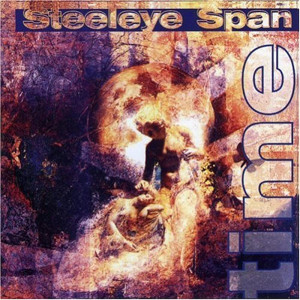 In 1996 Steeleye Span found itself at one of its career high points. Even if one of the reasons was born from misfortune, that is the return of original member Gay Woods to help relieve Maddy Prior’s fluctuating voice problems, the resultant lineup was one where the whole seemed even stronger than its already talented parts. I recall seeing the lineup of Prior, Woods, Knight, Johnson, Harries and Genockey live at the time, bringing along a friend who hadn’t seen them before, and who was amazed at the power of these old folk rockers.
In 1996 Steeleye Span found itself at one of its career high points. Even if one of the reasons was born from misfortune, that is the return of original member Gay Woods to help relieve Maddy Prior’s fluctuating voice problems, the resultant lineup was one where the whole seemed even stronger than its already talented parts. I recall seeing the lineup of Prior, Woods, Knight, Johnson, Harries and Genockey live at the time, bringing along a friend who hadn’t seen them before, and who was amazed at the power of these old folk rockers.
This particular Steeleye only recorded the one album, though there is also a Time VHS video wherein the band mimes to each track in front of an audience as if it is a live gig! It’s interesting to note that compared to their true live sound, the performance on the video comes across as quite restrained, but listening to the CD of the same recordings, it is a powerful and confident work.
Not having listened to the album for a while, its strength and charms became quickly familiar again. The harmonies and skilful musicianship are predictable; one aspect that is also quickly apparent is that it’s quite a bloody album – exemplified by the dramatically arranged “Corbies,” “The Elf Knight” (wherein the tables are turned on an elfin murderer by his canny victim), and the moving “You Will Burn,” a band original sung by Peter Knight. The latter has a theme of evil masquerading as good in a religious sense, with a Pagan theme that is also evident in the altogether jauntier “Harvest Of The Moon.”
As is usual with Steeleye Span songs, there is a blurred line between original and traditional material in some cases, but the booklet for Time is more specific than previous albums as to which part of which track belongs in either category. The combination is usually so seamless as to really not matter, since the overall effect works so well. Examples include the opener “The Prickly Bush,” a variant of the ‘Gallows Pole’ theme, and “The Elf Knight” which is a classic big ballad with a gorgeous violin solo by Peter Knight (no relation), and even features Maddy Prior throat singing at the end. Both songs feature the distinctive vocals of Bob Johnson, who for many years was usually the main writer of non-traditional music for the band’s trad-based songs.
Prior sings lead on just a few songs such as “Underneath Her Apron” and shares lead with Gay Woods on other tracks including the amusing “The Old Maid In The Garrett.” The latter song, introduced to the band by Woods, has one strange quirk that sometimes appeared in arrangements at the time, where there is an instrumental break with no one taking the lead. Instead, it’s a general effect of all players waiting for someone to do something, and when no one does, they go back to the song. I’m sure that wasn’t the intention but it just seems a little odd.
Tim Harries played a significant role in Steeleye over the years, and though his main instrument was the bass, he also provides keyboards on a few tracks including a rather free form version of the traditional “The Water Is Wide,” where Woods takes the lead vocals. Indeed live, if not on CD, he sometimes managed to play both instruments at once; hitting the bass strings hard with his left hand while playing the keys with his right!
The closing track is another original, sung by Peter Knight. “The singer may die, but … The Song Will Remain” is the theme and as a sensitive ballad along such lines, it could easily have veered into mawkish territory. Instead, it is intensely moving and heartfelt and impossible not to relate to on some level.
It’s altogether a very strong collection of songs and performances but unfortunately the lineup was not to last much longer. Indeed, Prior left after this album and did not return for many years, while Steeleye itself underwent a bewildering number of changes before it settled on its current line up around 2004. Perhaps it could be said this was a bit of an oasis between uncertain times for the band, as Time itself was their first studio album since 1989.
Taken on its own terms though, it’s easy to categorise this as one of Steeleye Span’s best efforts in their long career. Lyrics and song explanations are included in the booklet, for those of us who like to understand the meaning and rationale behind a song. Musically and thematically, the CD can be seen as not just one of the better illustrations of the band’s work but as a fine example of electric folk generally, for anyone needing an initiation. Quite possibly, they too will have catchy songs about witch burning, teenage pregnancy and murderous elves rolling around their heads for some time afterwards.
(Park Records, 1996)
